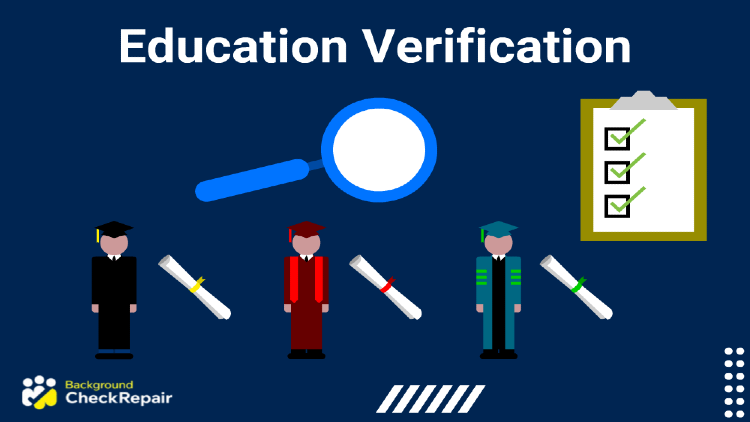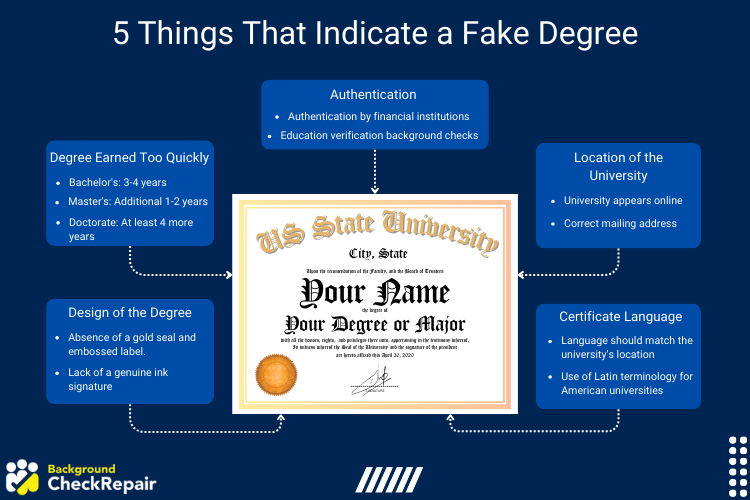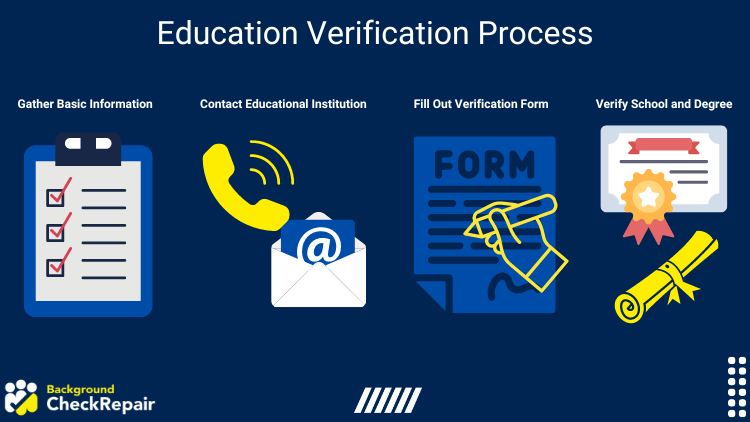
Knowing how to conduct an education verification check is an important part of the hiring process, and individuals who are seeking professional positions should know the processes involved in education verification.
Certain professions and industries require specific skill sets, and by using different data sources and receiving instant education verification, employers and co-workers can feel confident about the knowledge of any member of the team.
Here’s how to check education transcripts, enrollment, and diplomas for employment purposes.
What Is an Education Verification Background Check?
An education verification background check is a background search that confirms past education, degrees, courses, training, or certifications earned by a specific individual applying for an open position.
By confirming the person in question is telling the truth on the application, employers can verify the candidate is trustworthy and ensure they are qualified for the vacancy.
Individuals applying for specific job openings in the education sector might be wondering what shows up on an education background check. If a person is nervous about a poor grade they received in one of their college courses, chances are they will be fine. However, lying about their history, fake degrees, or unreliable references are all valid reasons for why an employer may decline an applicant.
What Does Verification Mean in Education?
Typically, employment background checks include the individual’s past references and work history.1 In this case, an education background check analyzes whether the applicant is being honest in terms of their past schooling, degrees, and date of attendance at the institution.2
An education verification background check does not have a time limit. When compared with other employment, such as a criminal background check that may only go back up to 7 or 10 years depending on the state, there is no time limit on the extent of background investigations for education verification.

Without the time constraint of a “typical” background check, employers will be able to confirm the statements of the individual in question — no matter what year they received their diploma, completed their classes or earned a certification.
Furthermore, in some instances, the background check will also show extra bonuses and honors earned by the student. Some education verification background checks can also include the overall GPA at the respective college or university.
5 Things That Indicate a Fake Degree: Education Verification Check Tasks
What is examined during a background investigation? There are some red flags and warning signs that employers check, which can indicate a fake degree, including:
#1. Design of the Degree
One of the first ways that an employer can spot a fake degree is by its style and aesthetic.3 Any verified degree will have a gold seal and embossed label. Employers check for the watermark on the label and a genuine signature written in ink.
#2. Degree Earned Too Quickly
Although there are exceptions, most students will obtain a degree in 3-4 years. If there is a discrepancy in the date of the degree, this can be a red flag. Employers know that a Master’s degree will take an additional 1-2 years, and a Doctorate will take at least four more years.
#3. Location of the University
The university’s location and confirmation of the address can point to a false degree. If the university does not appear online, there are no mailing addresses linked to the university, or the address is not correct during online searches, this is usually an indicator of a fake degree.
#4. Certificate Language
Another indicator of a bogus degree is the language on the certificate.4 If the person claims to have graduated from a University in Virginia, the language should be English. Other languages that are not in line with the university’s location are a red flag. In addition, using Latin terminology is a clear stand-out that something may be wrong with the certificate. American universities use Latin words, whereas other countries, such as England or Scotland, may use UK-based spelling and non-Latin phrases.
#5. Authentication
A lack of authentication by the financial institution can also point to a non-degree. Employers perform authentication searches and run an education verification background check to confirm verification of enrollment for their potential employees.
Education Verification Process: Education Verification for Employment
Education checks are part of a level 2 records check, especially when the job involves minors in an educational setting.

Doing enough research beforehand ensures that employers are not held liable for hiring an unqualified person for a job, and is also part of ensuring that federal funds can be issued.
The following practices are common for an education verification check:
How To Find Verification of Enrollment
The first step in an education verification background check is to gather basic information about the person.5 The information needed to conduct the search includes the full name of the candidate, the name of the educational institution, the location of the institution, the dates attended, the title of the degree (i.e., Bachelor’s of Science), and a signed release from the person in question.
Next, contact the educational institution to confirm the attendance of the specified applicant in terms of the dates, degree, and major. After contacting the university, employers also research the institution to ensure it is credible and recognized by an accrediting agency.
An education verification form is a tool that can verify the past educational history of the person in question.
Individuals must enter the schools attended, degree earned, courses taken, and GPA to submit to the specific university for confirmation.
To do this, simply use the state list below for the state being checked, and enter the information required on the verification form.
How To Verify School and Degree
To verify school and degree, employers can simply ask the applicant to provide proof of accreditation to the financial institution and the degree earned.
Transcripts can be sent directly to the agency hiring.
Education Verification Check Laws All 50 States
Employers that perform an education verification check in their respective states must comply with state laws.
The following links outline what employers, in every state, can ask when conducting education verification, as well as the method for performing an education background check.
How To Get an Education Verification Check Free
Is there a Free Education Verification Background Check? Yes, there is! Although some websites and corporations may charge a small fee, there are multiple online resources that provide employers with the tools to research a candidate’s educational history. Some include:
- NSC Verifications — National Student Clearinghouse Verification Services is a background check service that verifies postsecondary enrollment and graduate information for most students enrolled in a U.S. educational institution. NSC can verify enrollment, certifications, degrees, graduation confirmation, and high school diplomas.
- Reddit — Individuals can use the education verification tool on the Reddit website to find more information about the person in question.
What Is a Failed Education Verification?
A failed education verification is a portion of the background check that shows lies about an applicant’s attended institution, dates of attendance, degrees earned, diplomas earned, certifications, or courses taken.
Education discrepancies can be one of the main causes of a negative background check report.
Keep in mind that the extent of a job-related background screening can be 10 years or more depending on the state.
How Long Does Education Verification Take?
An international education verification may take longer than a national education verification. The typical turnaround time for an education verification check is around 3-4 days, although the time frame may vary based on each case.
By running an education verification check for a person’s diploma, courses, certifications, and institutions attended, employers are able to confirm that an applicant has the skills required, and is trustworthy for the position.
Frequently Asked Questions About an Education Verification Check




